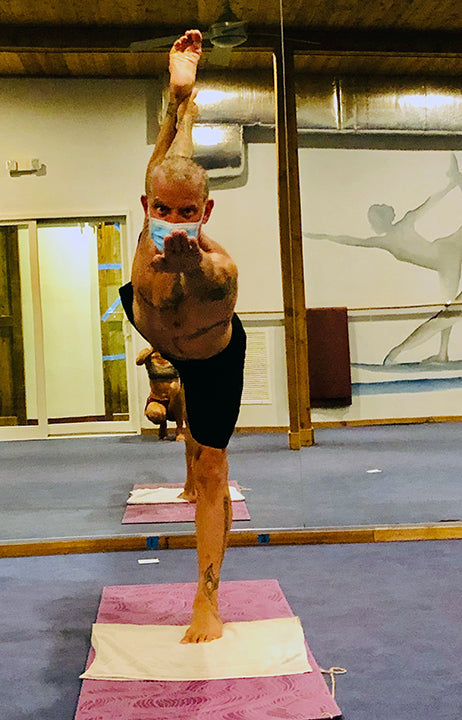Meditation and Yoga: A Path to Sobriety and Inner Peace
Yoga and meditation have played a significant role in shaping who I am today and guiding me on the path of sobriety. It's important not to view meditation as an escape into the cosmos or liberation from time's constraints. While such experiences may exist, they haven't been mine. Instead, I find the allure of meditation in its early stages, like using a navigation app to observe and navigate the incessant stream of thoughts and distractions that occupy my mind throughout the day.
For me, meditation offers a profound opportunity to explore the emergence of anxiety within my body—the palpitations of my heart and the surge of adrenaline. It allows me to assess the needs of different aspects of myself. Sometimes, I require high activity levels; other times, the urge to create arises. The love of my wife or the proximity of my children can be essential, while occasionally, I seek solace in watching TV. By closely monitoring these fluctuations, I can discern which pursuits lead me to frustration and anxiety and evaluate whether the accompanying anxiety is worthwhile. If not, I choose to let it go.
During my years as a skydiver, anxiety and stress filled my mind due to the dangerous nature of the sport. Immersed in the adrenaline-fueled world of skydiving, it became a distraction from truly being present with myself, preventing me from confronting my uncomfortable, insecure, and lonely inner self—feelings I had carried since childhood. As I grew older, I sought out various adventurous activities like sports, rock climbing, skydiving, Thai Boxing, scuba diving, and motorcycling as a means to divert my focus away from the chaotic thoughts in my mind.
Directly attempting to meditate was challenging initially, especially after becoming sober at 15. I struggled due to my lack of knowledge about the practice, and anxiety would arise, accompanied by boredom and feelings of inadequacy. However, meditation is a process of gaining control over the mind, metaphorically observing its tendency to wander and jump from one thought to another. This behavior is natural, stemming from our innate curiosity as infants, where we constantly seek to explore and learn to survive in the world.
The anxiety I experienced in childhood was a normal response, but the constant upheaval caused by moving between states and my parents' separation exacerbated these feelings, leading to chronic anxiety. The lack of regular contact with my mother, who took my sister to New York while I stayed in Los Angeles, contributed to a survival tactic of emotionally distancing myself from her.
Now, at 54, I realize that when I engaged in Thai Boxing, my focused breathing and intense exercise served as a form of meditation, similar to the experience in a yoga class. During those moments, I was entirely present, immersed in the subject matter without consciously acknowledging it as meditation. Some lessons were easily absorbed because of this presence, while others took longer to sink in when I was distracted and less focused.
I vividly recall my accomplishments as a fighter, participating in Good Friday night fights and successfully making all my weights, dedicating myself to rigorous training for each fight. I even take pride in a specific instance where my shin bone broke an opponent's ocular bone during a well-executed kick, and his hands came down in defeat.
Through these reflections, I have come to understand that meditation is not solely about escaping reality but about embracing the present moment and gaining control over the chaotic fluctuations of the mind. It allows me to explore the depths of my inner self, confront my fears and insecurities, and ultimately find peace and understanding amidst life's uncertainties.
The true essence of meditation lies in its ability to cultivate control and tranquility within the mind. The practice serves as preparation for moments beyond meditation, especially when I encounter triggering situations that disturb my inner harmony. Through meditation, I acquire the necessary tools to respond to such challenges with calmness and respect for my personal boundaries, fostering positive and thoughtful reactions.
In essence, meditation serves as a calming and therapeutic self-help practice, allowing me to find solace amidst the turbulence and disruptions inherent in modern life. The constant barrage of stimuli and demands often results in a restless and agitated mind. However, through regular meditation, I can reclaim my mental composure, restoring a sense of balance and tranquility.
The benefits of meditation extend far beyond the quiet moments spent in meditation itself. It equips me with resilience and composure in the face of life's challenges. When triggered, I can draw upon the serenity cultivated during meditation to respond rather than react impulsively. By maintaining a relaxed and centered state of mind, I can navigate difficult encounters with greater clarity and compassion.
Moreover, meditation helps me recognize the impermanent nature of emotions and thoughts, allowing me to refrain from being swept away by fleeting negativity or distress. It provides a sanctuary within, wherein I can observe these passing disturbances without becoming entangled in their intensity.
In a fast-paced and interconnected world, meditation has become an invaluable tool for self-awareness and emotional regulation. By regularly engaging in this practice, I learn to embrace stillness amidst the chaos and cultivate a deep sense of self-understanding. This newfound clarity empowers me to make conscious choices that align with my values and aspirations, fostering a more fulfilling and harmonious life.
Ultimately, meditation becomes a refuge for the mind, a sanctuary where I can unburden myself from the stresses of modern life and reconnect with my inner essence. It reminds me that amidst the noise and distractions, I possess the power to find peace and serenity within and navigate the complexities of life with wisdom and grace.
